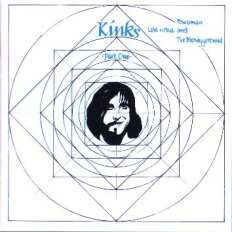- Lola versus Powerman and the Moneygoround, Part One
Infobox Album |
Name = Lola versus Powerman and the Moneygoround, Part One
Type =Album
Artist =The Kinks

Released =27 November 1970
Recorded = April and September 1970
Genre = Rock
Length = 41:12
Label = Pye
Producer =Ray Davies
Reviews =
*Allmusic Rating|4.5|5 [http://www.allmusic.com/cg/amg.dll?p=amg&sql=10:3zsyxddb5old link]
*Blender Rating|4|5 [http://www.blender.com/guide/reviews.aspx?id=3840 link]
*Robert Christgau (B-) [http://www.robertchristgau.com/get_artist.php?id=1464&name=The+Kinks link] |
Last album = "Arthur (Or the Decline and Fall of the British Empire) "
(1969)
This album = "Lola versus Powerman and the Moneygoround, Part One"
(1970)
Next album = "Percy"
(1971)"Lola versus Powerman and the Moneygoround, Part One" is an album by the English rock band
The Kinks , recorded and released in 1970.Lyrically, "Lola versus Powerman" is a satirical look at the various facets of the music industry including song publishers ("Denmark Street"), unions ("Get Back in Line"), the hitmaking machine ("Top of the Pops"), accountants and business managers ("The Moneygoround") and the road ("This Time Tomorrow"). "Apeman" finds Davies becoming fed up with it all and expressing a desire to leave society and go swinging through the jungle. The closing track, "Got to Be Free", is an anthem for maintaining personal independence in the face of all opposition. Musically, the album is an extremely varied affair, contrasting gentle ballads like "Get Back in Line" and "A Long Way From Home" against songs like "Rats" and "Powerman", two of the hardest rockers in the Kinks repertoire. "Denmark Street" and "The Moneygoround", like much of Ray Davies's work, pay homage to the English
music hall tradition. The album's most famous song and a worldwide hit single, "Lola", is about an encounter with a tranvestite. Encouraged by his father, Davies consciously and carefully crafted the song to be a hit after a long dry spell for the band on both the U.K. and U.S. charts. He was even forced to fly from the United States to England to overdub the trademarked word "Coca-Cola" from the original master tape to prevent potential legal problems. The success of the single and album had important ramifications for the band's career at a critical time, allowing them to negotiate a new contract withRCA Records , construct their own London Studio and assume more creative and managerial control. "Lola" also became their most popular sing-a-long anthem at concerts, as they struggled to regain a footing in the U.S. concert market after theAmerican Federation of Musicians , who had refused permits for the group to perform concerts there since 1965, relented in 1969. [ [http://kinks.it.rit.edu/misc/articles/kinksin.html Who Let the Kinks In?] , Loraine Alterman, "Rolling Stone ", 18 December 1969, archive copy on Dave Emlen's Unofficial Kinks Web Site, accessed 17 September, 2007]Track listing
All tracks written by
Ray Davies except where noted.#"Introduction" – 0:41
#"The Contenders" – 2:44
#"Strangers" (Dave Davies ) – 3:21
#"Denmark Street " – 2:03
#"Get Back in Line" – 3:06
#"Lola" – 4:04
#"Top of the Pops" – 3:41
#"The Moneygoround" – 1:48
#"This Time Tomorrow" – 3:23
#"A Long Way From Home" – 2:28
#"Rats" (Dave Davies) – 2:41
#"Apeman" – 3:53
#"Powerman" (Ray Davies/Dave Davies)– 4:19
#"Got to Be Free" – 3:00Bonus tracks
Bonus tracks from the CD reissue.
#"Lola" (mono single mix) - 4:08
#"Apeman" (acoustic demo) - 3:41
#"Powerman" (acoustic demo) - 4:23Personnel
*
Ray Davies - Lead Vocals, Guitar,Harmonica , Keyboards
*Dave Davies - LeadGuitar ,Banjo , Backing Vocals, Lead Vocals on *, Co-Lead Vocal on "Powerman"
*John Dalton -Bass Guitar , Backing Vocals
*Mick Avory - Drums, Percussion
*John Gosling -Keyboards ,Piano , Organoundtrack appearances
"This Time Tomorrow", "Strangers", and "Powerman" appear in the 2007
Wes Anderson film "The Darjeeling Limited "."This Time Tomorrow" appears in the 2005
Philippe Garrel film "Les Amants réguliers ".References
Wikimedia Foundation. 2010.
